I received a digital ARC of this book from Random House on NetGalley. I’m grateful to Random House for their generosity and, because I was fascinated by this book, was happy to post this honest review. All opinions are my own.
I started Educated as part of a buddy-read with Rachel of Reading Brings Joy, thinking I was behind because everyone else had already started. And then I finished the book approximately thirty-six hours later, pausing only to sleep and fulfill my dog-walking duties at the Humane Society. Had I been reading this during the week, I might have called in sick to finish.
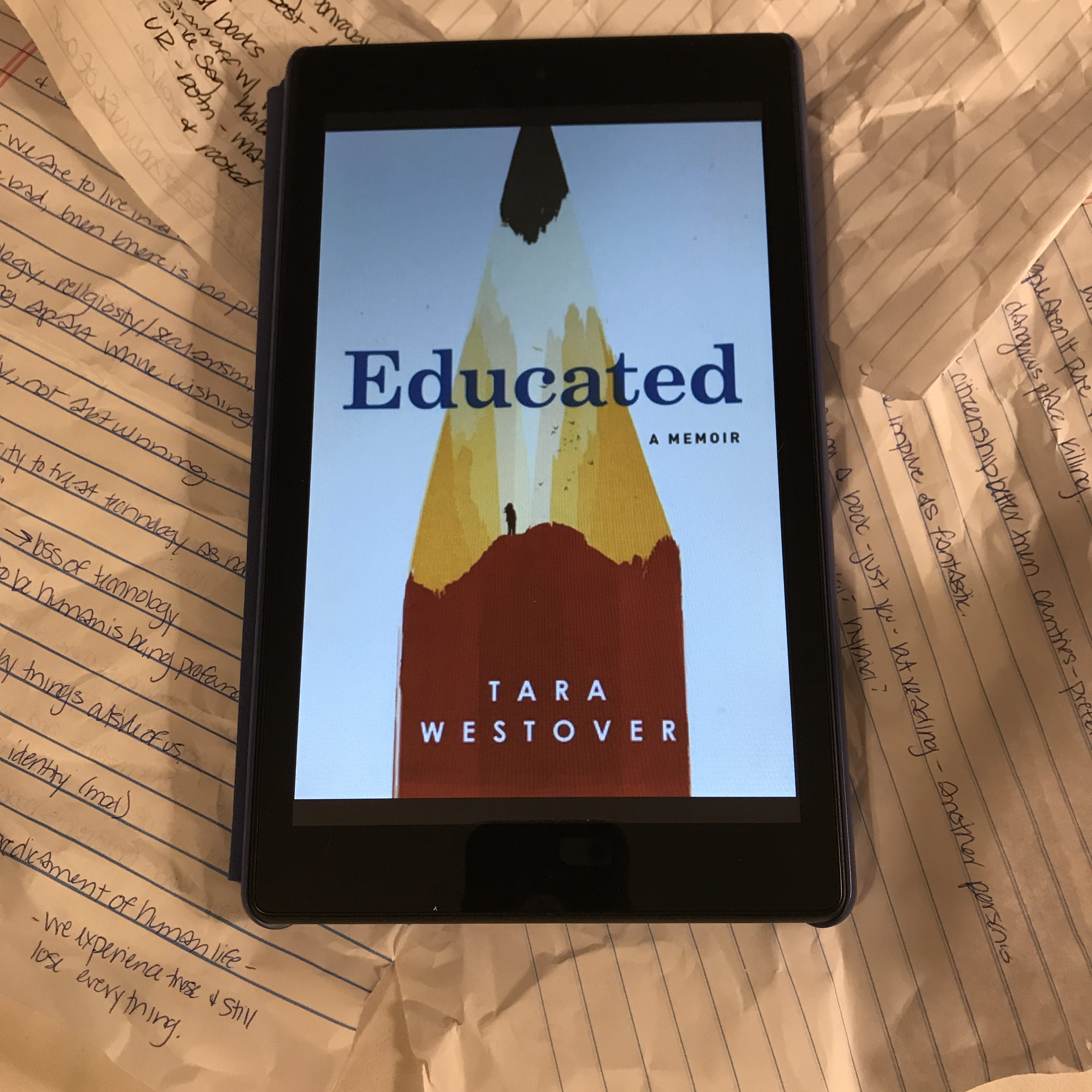
Synopsis
Tara Westover grew up off the grid in Idaho, raised by survivalist parents whose distrust of the establishment extended to traditional schooling and medical care, relying instead on an extreme version of Mormonism and faith-healing. In her formative years, Westover endured extreme neglect at the hands of her parents and physical abuse at the hands of an elder brother who was never held to account for his assaults. When Westover was sixteen, she was admitted to Brigham Young University where the world expanded in ways that would leave her irrevocably changed. For Westover these changes were ultimately incompatible with the person her family expected her to be. Educated is the story of how Westover, now a Ph.D. in history, was formed by her childhood experiences, survived them, and even thrived in spite of them.
Every Trigger Warning for Everything, Ever
The story featured in Educated needs every trigger warning. Westover and her siblings suffered pretty severe physical abuse, extreme neglect, and shocking child endangerment. There is some of the most triggering gas-lighting I have ever read and, if memory served, just about the only trigger warning this book doesn’t need is rape—though misogyny and gender-based verbal and physical abuse occurs. For people leaving oppressive faith subcultures, portions of this book may also be triggering as much of the abuse within Westover’s family was cloaked in religious language to excuse the oppressors and justify their actions. While I found this book absolutely fascinating and was able to push past some of these triggers for me, this is not a book to read if you are in a place where you need to be gentle with yourself or are particularly triggered by child abuse, gas-lighting, or spiritual toxicity.
Controversy
The Amazon reviews for this book are a bit different than most since mixed in with the general reviews are reviews submitted by family members and family friends. Several of the family members who are still within the fold gave the book one star and claim it’s all fiction (This is probably half of the current one-star reviews). The boy Westover dated in college, Drew, posted a review and indicates that the sections that are within his knowledge are presented accurately.
Her brother Tyler at one point also posted a review, though his was slightly less congratulatory. He questioned Tara’s recollections of some of the events, though he admitted within the review that he wasn’t there for some of the events she described. He seems to have taken his review down since I can’t find it anymore—if I recall it was a three or four-star review, so overall positive and supportive for her.
Stranger than Fiction
Some of the other negative reviews question the overall veracity of the story. Westover’s memoir is fascinating in a terrifying way—it’s one of those truth-is-stranger than fiction and if this weren’t her real life, her editor would have been telling her to tone it down. I am hoping/assuming that after the Frey debacle many years ago, memoirs like this are more thoroughly fact-checked than they used to be. I’m not bothered by family members still toeing the party line in the Amazon comments, but the book is so fantastic that it screams for a fact-checker to confirm at least the scaffolding of the story—Westover’s absence of a birth certificate, absence in school, lack of a documented medical history, and other things that woud be independently verifiable.
I would also assume (dangerous, I know) that Westover as an academic would understand what it would do to her reputation and career if she were caught fabricating this kind of memoir. It isn’t meant to be an academic exercise but I can’t imagine many prestigious universities want to give tenure to professors or otherwise employ historians caught fabricating New York Times Bestsellers. With this in mind, I’m left with believing Westover’s story as the truth. She’s the victim, she has no real reason to lie, and the consequences of this being fabricated are far too damaging to make it worth the risk to her professionally.
Delivery
Westover’s delivery is matter-of-fact—so matter of fact some reviewers have commented on it sounding almost rote. For a less eventful story, this delivery would have definite drawbacks, chief among them putting the reader to sleep. For Westover’s story, however, it worked. She doesn’t have to use lyrical language or drip adjectives over her sentences to gain attention and doing so would have been overkill here. The action here very much speaks for itself.
With all of the craziness of Westover’s childhood events, the story moves at a pretty quick pace. There are no idylls in the wildflowers, save for the occasional sentence about the woman in the mountain who watched over Westover as she grew up at the foot of the mountain. There aren’t really “slow” parts so much as there are slightly less-shocking moments in between the shocking ones.
The only criticism I have of Westover’s delivery is that it did feel at times like one horror after another. I wondered if there were good times Westover could have shown. I was left with the sense that a kind of Stockholm Syndrome kept her in place, which could certainly be accurate. But even the worst parents can have some redeeming moment—some snippet in time when they are capable of showing love. I didn’t feel Westover showed the reader any of these times (or if she did, it made no impression and there could have been more). I believe it was hard for Westover to leave—but the hits-keep-coming feeling and the sense of why it was so hard to leave would have been better modulated with a few more moments of levity and love, if they were available for Westover to tell us.
Recommended
Though this is a work of nonfiction, Edcuated is so fast-paced, this work almost served like one of my palate-cleanser thrillers—I gobbled it up and it reset my reading after a string of more literary and slower works. The emotional rollercoaster in the book is work, but the reading of it isn’t. If you are in a place where this book won’t be triggering, this is one I highly recommend.
Notes
Published: February 20, 2018 by Random House (@randomhouse)
Author: Tara Westover
Date read: March 31, 2018
Rating: 4 stars

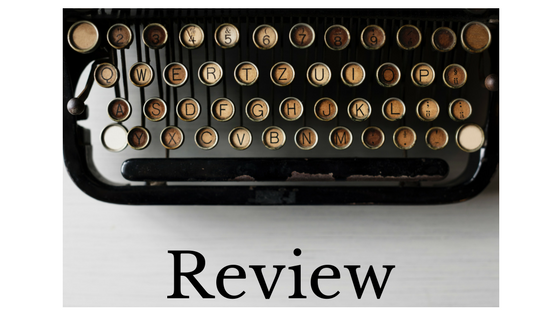
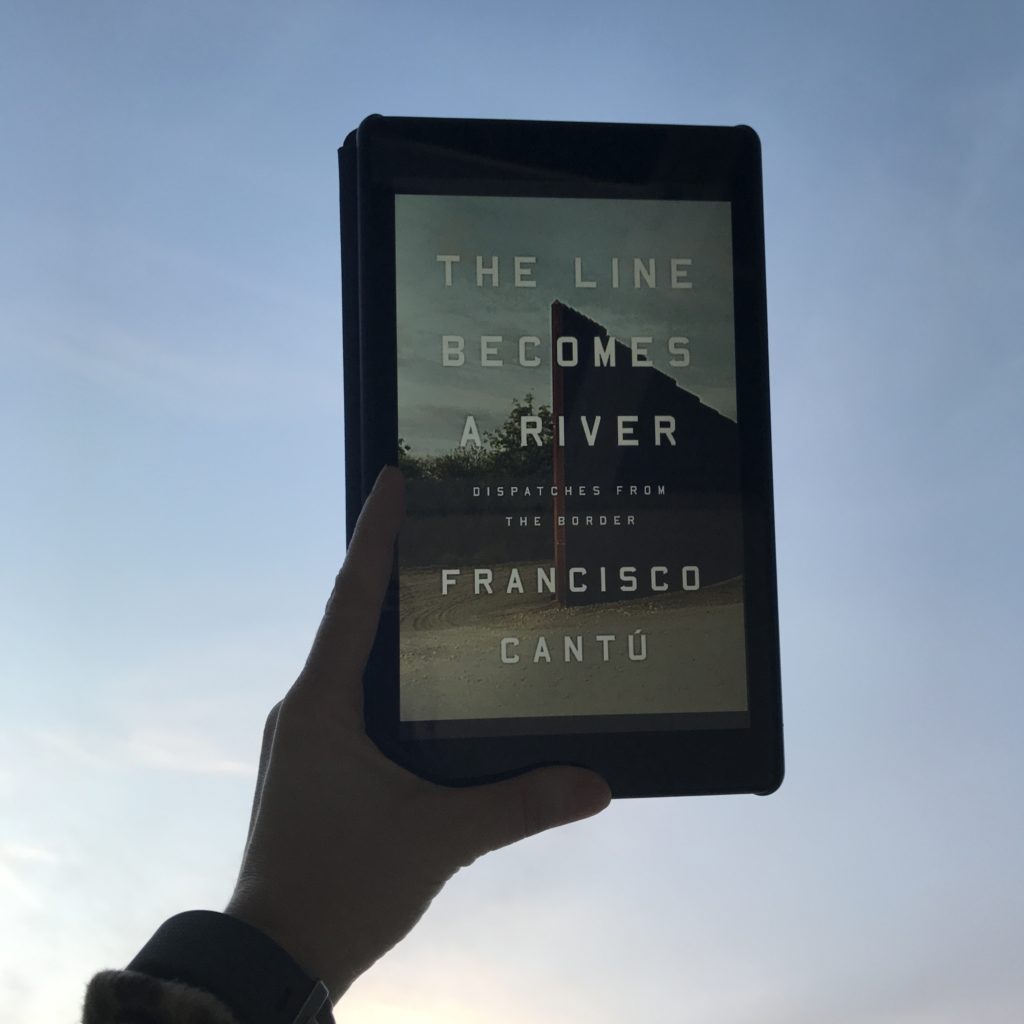 Conflict
Conflict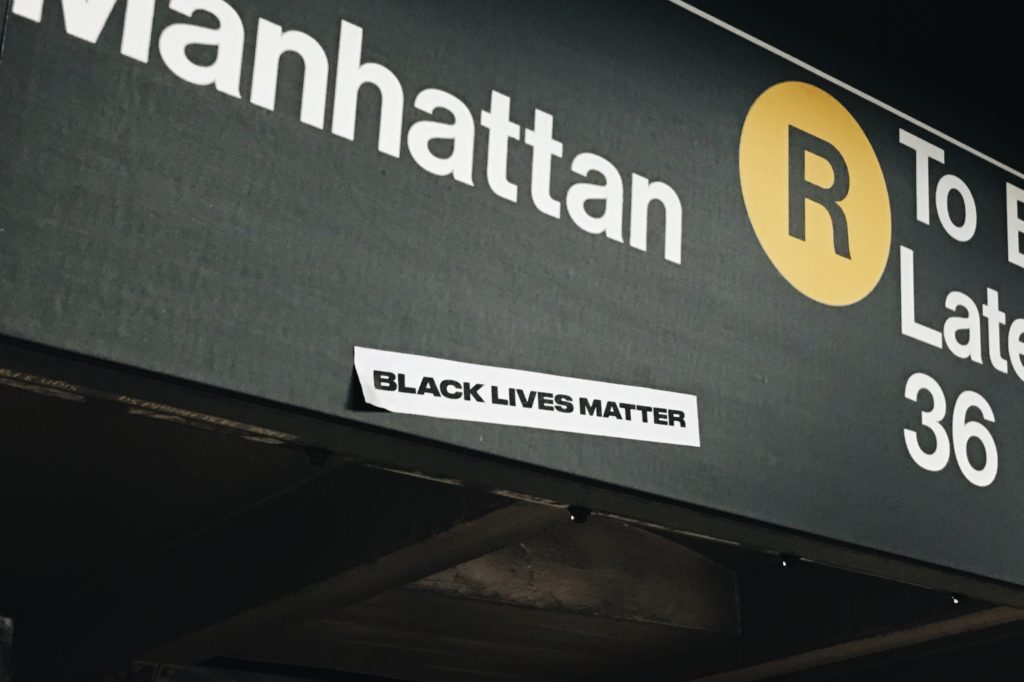
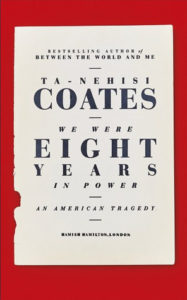 Coates’s most recent offering is a compilation of the essays he wrote for The Atlantic during the eight years of Obama’s presidency, one per year, with commentary of what was going on in his life and the life of many black Americans during each of the eight years. Because the essays were originally magazine articles, there is some repetition among them of certain points or common phrases that, if this were a book of essays, would likely have been edited to fit better. None of the thoughts or arguments that were repeated were long, so the repetition didn’t bother me as a reader, nor did it cause me to go into skim mode. It was just noticeable. The introductions to each article were interesting in that, while the context was helpful, Coates also comments on the following article—things he wished he had done differently, whether some of his points or predictions held up, and general criticism of his work. As a reader, this was a strange device and it made me wish that the “intro” essays followed the pieces instead. His critique of his own work colored how I read the article and I wished before some of them that I had a chance to form my opinion before reading his hindsight-critique.
Coates’s most recent offering is a compilation of the essays he wrote for The Atlantic during the eight years of Obama’s presidency, one per year, with commentary of what was going on in his life and the life of many black Americans during each of the eight years. Because the essays were originally magazine articles, there is some repetition among them of certain points or common phrases that, if this were a book of essays, would likely have been edited to fit better. None of the thoughts or arguments that were repeated were long, so the repetition didn’t bother me as a reader, nor did it cause me to go into skim mode. It was just noticeable. The introductions to each article were interesting in that, while the context was helpful, Coates also comments on the following article—things he wished he had done differently, whether some of his points or predictions held up, and general criticism of his work. As a reader, this was a strange device and it made me wish that the “intro” essays followed the pieces instead. His critique of his own work colored how I read the article and I wished before some of them that I had a chance to form my opinion before reading his hindsight-critique.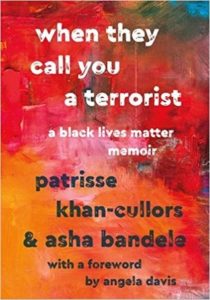 The focus of probably the first half of When They Call You a Terrorist was not what I expected since Khan-Cullors’s recollections seemed more about her brother’s experience with an inadequate public and prison mental health system than it did on her brother’s blackness. Which is not to say that his blackness was ignored or even that his blackness didn’t greatly affect the way the mental health and law enforcement systems responded to him. I simply didn’t know much about Khan-Cullors before listening (I think literally the only thing I could recall hearing about was her partner’s being detained trying to come into the country from Canada) and so did not expect the lengthy discussion of mental illness. Her compassion for her brother and the way the family tried to treat him and have others treat him with as little force as possible made me hurt for her. (Khan-Cullors reads the book herself, which added to the tragedy inherent in many of the sections.) Because so much of the first half of the book is simultaneously a study of being black and having a mental illness, I would go so far as to say that if you’re interested in hearing about the lived experience of trying to obtain mental health care in a broken system, this is a powerful book for that alone.
The focus of probably the first half of When They Call You a Terrorist was not what I expected since Khan-Cullors’s recollections seemed more about her brother’s experience with an inadequate public and prison mental health system than it did on her brother’s blackness. Which is not to say that his blackness was ignored or even that his blackness didn’t greatly affect the way the mental health and law enforcement systems responded to him. I simply didn’t know much about Khan-Cullors before listening (I think literally the only thing I could recall hearing about was her partner’s being detained trying to come into the country from Canada) and so did not expect the lengthy discussion of mental illness. Her compassion for her brother and the way the family tried to treat him and have others treat him with as little force as possible made me hurt for her. (Khan-Cullors reads the book herself, which added to the tragedy inherent in many of the sections.) Because so much of the first half of the book is simultaneously a study of being black and having a mental illness, I would go so far as to say that if you’re interested in hearing about the lived experience of trying to obtain mental health care in a broken system, this is a powerful book for that alone.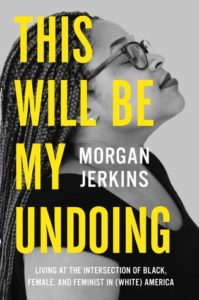 Admittedly, of the three books featured here, this one probably made me the most uncomfortable, but mostly because I don’t read very many books that prominently feature essays about labia and vibrators. Which, let me quickly add, were not mentioned for shock value—this wasn’t a book that I felt like I wanted to put down because it veered into the gross-Lena-Dunham-esque territory. There were just a few moments of “oh—I don’t know that I’d talk about that publicly but here we go.” I will say, this book probably made me the most uncomfortable of the three, though it was an uncomfortable that, like
Admittedly, of the three books featured here, this one probably made me the most uncomfortable, but mostly because I don’t read very many books that prominently feature essays about labia and vibrators. Which, let me quickly add, were not mentioned for shock value—this wasn’t a book that I felt like I wanted to put down because it veered into the gross-Lena-Dunham-esque territory. There were just a few moments of “oh—I don’t know that I’d talk about that publicly but here we go.” I will say, this book probably made me the most uncomfortable of the three, though it was an uncomfortable that, like 
 You Don’t Have to Say You Love Me is an extended elegy for Lillian Alexie, mother of Sherman Alexie, award-winning Spokane-Coeur d’Alene-American author and filmmaker. Simultaneously cruel and kind, truth-teller and liar, selfish and selfless, Lillian Alexie helped form the man her son came to be, both by nurturing him and by driving him into the world away from her.
You Don’t Have to Say You Love Me is an extended elegy for Lillian Alexie, mother of Sherman Alexie, award-winning Spokane-Coeur d’Alene-American author and filmmaker. Simultaneously cruel and kind, truth-teller and liar, selfish and selfless, Lillian Alexie helped form the man her son came to be, both by nurturing him and by driving him into the world away from her.
 Wolf in Sheep’s Clothing
Wolf in Sheep’s Clothing